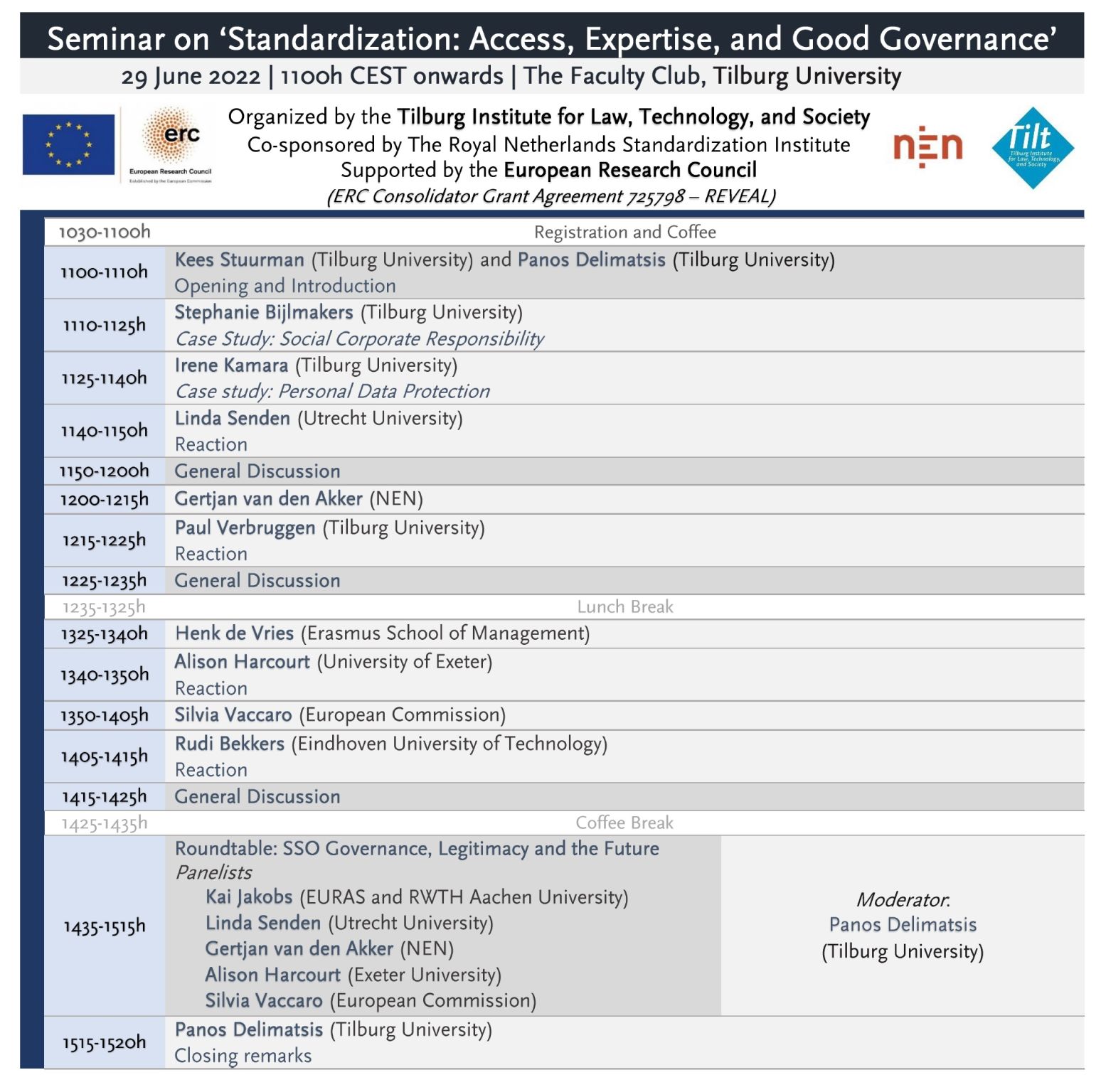Scientific Background and Goal of the Seminar
On the occasion of Prof. Kees Stuurman’s farewell, TILT is organising a seminar on policy and legal issues in standardization. This seminar aims to gather a diverse set of academics, policymakers and experts in standard-setting to discuss a number of legitimacy- and diversity-related issues, in particular access, expertise, and governance of standardization in Europe.
Legitimacy is multi-faceted and relates to both participation in the standard development process (‘input legitimacy’), the design of that process (‘throughput legitimacy’) as well as to the standards resulting from the process (‘output legitimacy’). The legitimacy of standardization as a regulatory instrument has been a contentious issue since the beginning of the European New Approach. Recently, the debate has been given a new impetus by a landmark case of the Court of Justice of the European Union: James Elliott Construction Ltd v Irish Asphalt Ltd (C-613/14). The Court ruled that the relevant harmonized standard (HS) of which the references have been published in the Official Journal of the European Union ‘forms part of EU law’. This ruling clarifies the legal status of HSs under EU law, but also leaves fundamental questions open, including the exact scope of the Court’s jurisdiction in relation to HSs and whether there is formal delegation of powers to the European Standardization Organizations (“ESOs”). Another relevant question concerns the role of copyright in HSs. In the Public.Resource.Org, Inc. and Right to Know CLG (T-185/19), the General Court of the EU recently dismissed a claim against copyright in HSs. The case is currently under appeal. In that context, the Stichting Rookpreventie Jeugd and Others (C‑160/20) could be relevant and arguably prejudge the CJEU’s stance in this very important question of access. Based on the principle of legal certainty, the CJEU found that in case of mandatory reference to international standards developed by the International Organization for Standardization (ISO) in a legislative act of the European Union, the standards are binding on the public generally only if these have been published in the Official Journal. Still, the Court avoided answering the question of whether access also includes free access to mandatory standards.
The impact of the legitimacy debate is also visible in the recent EU Standardization Strategy Communication (COM(2022) 31 final) in which the European Commission (“EC”) called for modernizing governance and strengthening integrity of the European Standardization System based on administrative and good governance principles. The EC highlighted the need to safeguard European interests, and improve accessibility and inclusiveness for small and medium entreprises, members of the civil society and other users. Also the Commission calls on the ESOs to consider free access to standards and other deliverables. In this context, the ESOs were asked to consider proposals for modernization of their internal governance by end of 2022. If insufficient progress is made, the Commission may propose a revision of the Standardization Regulation (EU) No 1025/2012.
Over time, the scope of standardization has expanded far beyond traditional engineering fields and now, encompasses as well ‘softer’ topics such as social responsibility, ethics, data protection, and more. Fundamental rights issues resulting from the ‘data revolution’ have put additional pressure on regulators and the standardization community to adequately respond and address legitimacy- and diversity-related challenges. This includes integrating new skills; ensuring diversity of voices, including gender-related questions; attracting more diverse expertise; and appealing to younger generations of experts into the standardization process.
These developments lead to a series of research questions relating to access, expertise and governance of standardization in Europe. These questions include (but are not limited to):
- Which organizational, procedural and legislative measures could or should be taken to safeguard the New Approach? Will/Should the New Approach in its current form withstand the current legitimacy-driven debate?
- What is the object and likely impact of the EU Standardization Strategy on legitimacy, access and expertise at the NSO and ESO levels?
- Is free access to harmonized standards a necessary and/or sufficient condition for ensuring the legitimacy of SSOs at the national, regional or international levels? If so, what are the possibilities for the ESOs and NSOs to move towards free access to harmonized technical specifications and other regulatory standards within the existing business models? Are there any best practices to learn from? What will be the impact for the ESOs/NSOs if the CJEU denies copyright in the case of HTSs?
- What is the likely impact of the Stichting Rookpreventie Jeugd and Others (C‑160/20) at the EU but also international level? How does it affect the ISO business model but also the organization’s overall legitimacy?
- What measures are needed to ensure more diverse expertise in the standardization process? What could be the role of universities and institutions for higher education?
- How can the participation of SMEs and other stakeholders in the standardization process be significantly improved at national level while preventing complexity, overload and deadlock in the committees? Have NEN or other national SSOs experimented with new rules? If so, what lessons have they drawn?
- The debate on the legitimacy and good governance of standard setting is fueled by the regulatory use of standards. What are exactly the norms against which the standard setting is evaluated in this respect? How is legitimacy of standard setting valued when compared with the legitimacy of the regular legislative procedure (and its known assumptions and shortcomings)?
These questions will be central during the seminar and will be discussed on the basis of the presentations and discussions between policymakers and academics.
The Royal Netherlands Standardization Institute (NEN) co-sponsores this seminar.
Seminar Program

Organizers
- Prof. dr. Panos Delimatsis
- Prof. dr. Kees Stuurman
- Dr. Irene Kamara
- Shanya Ruhela